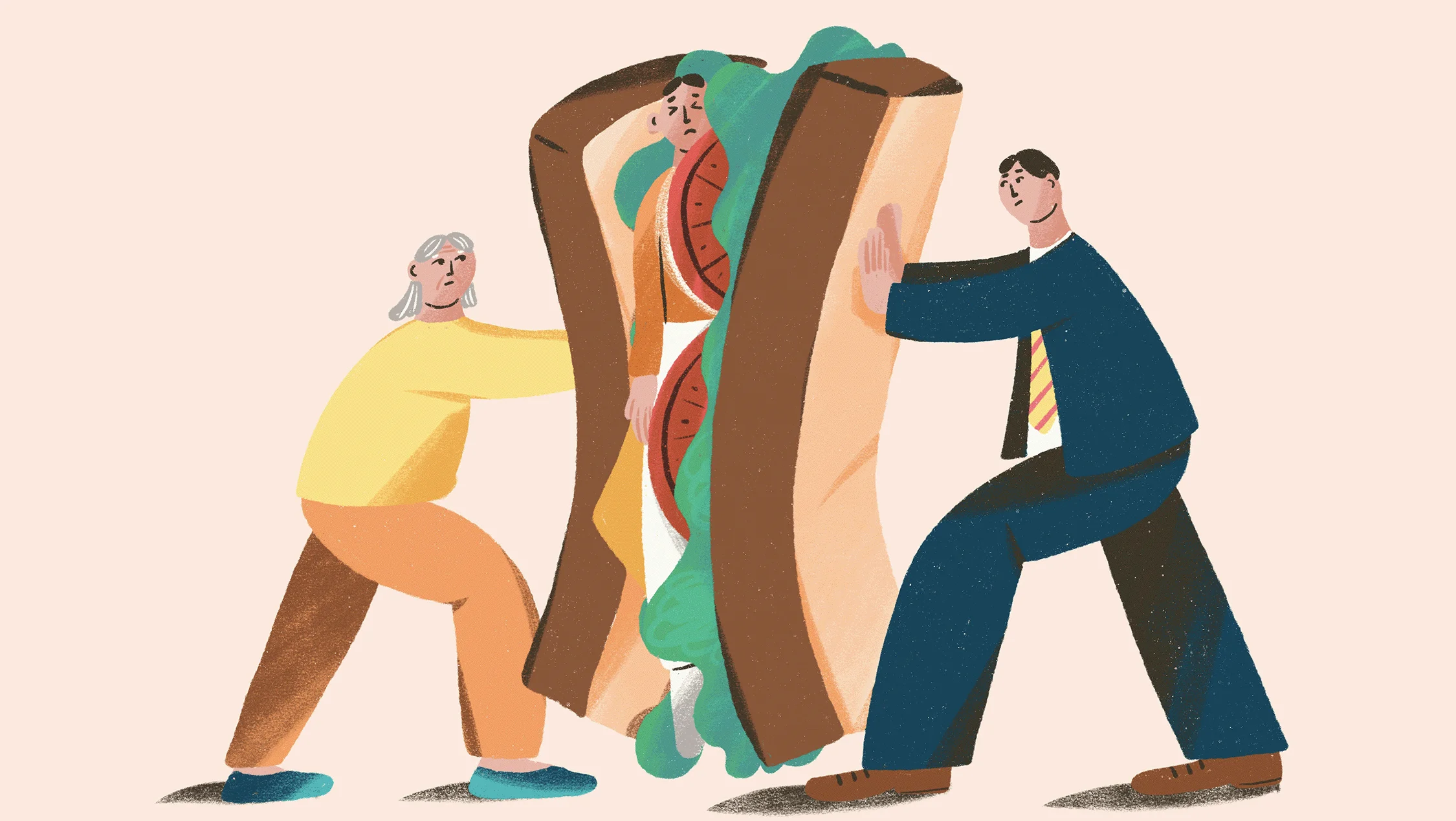
Initially a crunchy toastie; over time with repeated squashing from two sides, the fillings become soggy. This is the portrayal of the sandwich generation.
The sandwich generation generally refers to those caught between their aging parents and young children. Providing emotional, physical, and financial support to parents and children while juggling different stressors in self-development, career, finances, their well-being takes a toll. Local study found that adult children tend to take their own children as the top priority of their family responsibilities, while aging parents come in second, and their own spouse comes third. Wait, what about the sandwich generation themselves?
Expanding the definition of the sandwich generation, rather than taking care of parents, children, and spouse, we can also be squeezed between multiple roles, such as millennials navigating between family responsibilities, career advancement, and personal growth.
The sandwich generation may be facing quarter-life or midlife crises, such as feeling trapped by obligations, constrained life choices, and disillusioned by the future. Being stuck in between, the sandwich generation may experience difficulties finding ones’ identity, fulfilling their aspirations, and meeting daily, work, and family demands.
How to achieve self-actualization in the high and dry?
Juggling between demands, the sandwich generation may experience caregiver burnout, a condition characterized by chronic, overwhelming emotional, physical and mental exhaustion. They may feel unsupported, unappreciated, depressed, or even hopeless, wanting to isolate themselves emotionally and physically. In some cases, one may feel guilty towards their carees because of high self-expectations. Study found that caregiver burnout may relate to the feeling ‘‘having had to give up important things for themselves due to caregiving.’’ Beyond emotional strain, mixed feelings of duty and resentment toward carees may occur.

Healthy boundaries create better relationships
When one is overwhelmed by responsibilities, signs of burnout may arise, including feeling irritated, anxious, alone, loss of happiness and hope. On the flip side, burnout provides a window to reflect on the state of a relationship. Establishing personal boundaries is essential to be both physically and emotionally healthy.
In psychology, boundaries are a conceptual limit between you and the other person physically and emotionally, determined by the amount of physical and emotional space you allow between yourself and others. Similar to the “No Trespassing” sign, if others exceed the line, you may feel discomfort. Maintaining personal boundaries helps to develop long-term and healthy relationships, maintain mutual respect, recognize each other's needs, and strike for a balance, empowering both of you in the relationship.
We can first pay attention to our feelings and thoughts, get in touch with what we truly need behind the boundaries, and set them.
1. Division of work
Embrace that we all have our limits. Don’t take all the responsibilities yourself. You can invite family members to share basic household chores such as washing dishes and tidying up the home. Seeking help from relatives, friends, and community-based organizations to reduce the workload. In the workplace, you may delegate work to someone who is more suited when appropriate. Working with each other's strengths makes your team more effective than working alone. Learn to share responsibilities and solve problems together.
2. Personal time
Include “me time” in the schedule, it could be doing things that you enjoy or activities to unwind. For the time spent with others, be fully present and authentic with the people you are with.
Learn to be aware of your thoughts and feelings and express them clearly, especially on ways to improve the relationship. For instance, avoid using judgmental wordings in the conversation, focus on what the other person is sharing, try to understand their views and the emotions they are experiencing, and recognize both of your needs. For example, you may say ‘‘I know you want me to hang out with you. But I am exhausted after a day of work. How about we schedule for next week after I get some downtime?’’ When the boundaries are first set up, it takes time to adapt. It is a process. You can learn each others’ expectations through in-depth communication. Also, utilize the skills of repetition and ask clarification questions to ensure you both are on the same page.
“An intimate relationship is one in which neither party silences, sacrifices, or betrays the self and each party expresses strength and vulnerability, weakness and competence in a balanced way.” as Harriet Lerner, a clinical psychologist and author said. Respect your inner voice, establish your boundaries, and empower yourself to make healthy choices.
References:
Kwok, H. (2006). The Son Also Acts as Major Caregiver to Elderly Parents: A Study of the Sandwich Generation in Hong Kong. Current Sociology, 54(2), 257–272. https://doi.org/10.1177/0011392106056745
Gérain, P., & Zech, E. (2019). Informal Caregiver Burnout? Development of a Theoretical Framework to Understand the Impact of Caregiving. Frontiers in Psychology, 10, 1748. https://doi.org/10.3389/fpsyg.2019.01748
Kaufman, S. B. (2018). Self-Actualizing People in the 21st Century: Integration With Contemporary Theory and Research on Personality and Well-Being. Journal of Humanistic Psychology.https://doi.org/10.1177/0022167818809187
Srivastava, S., John, O. P., Gosling, S. D., & Potter, J. (2003). Development of personality in early and middle adulthood: set like plaster or persistent change?. Journal of Personality and Social Psychology, 84(5), 1041–1053. https://doi.org/10.1037/0022-3514.84.5.1041
Lam, R. C. (2006). Contradictions between traditional Chinese values and the actual performance: a study of the caregiving roles of the modern sandwich generation in Hong Kong. Journal of Comparative Family Studies, 299-313. https://www.jstor.org/stable/41604074
Online resources:
How to care for yourself when you have caregiver burnout. (2021).
https://www.healthline.com/health/health-caregiver-burnout
Shuman, C. (2021). Having good boundaries increases resiliency.

